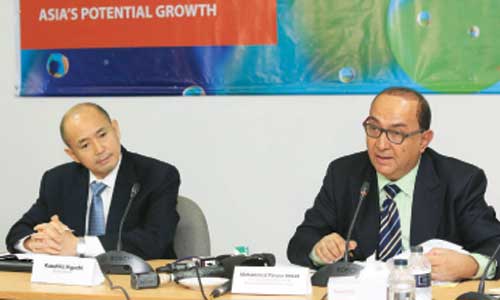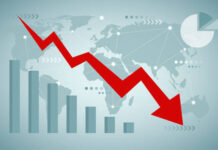The Asian Development Bank on Wednesday retained its 6.7-per cent growth projection for the Bangladesh economy for the current financial year of 2015-2016 because of a strong performance in readymade garment export.
The Manila-based multilateral lender also projected that the country’s GDP growth in the next financial year of 2016-2017 would be higher at 6.9 per cent assuming that the ‘domestic political calm’ would build consumers’ and investors’ confidence.
Bangladesh has projected 7 per cent GDP growth for FY16. The growth was 6.5 per cent in last fiscal year.
Retaining the gross domestic product growth projection it made in September 2015 for the current fiscal year, the ADB in the Asian Development Outlook 2016 released on Wednesday said that export growth would be higher than expected because of stronger garment exports.
Export earnings during the July-January period of FY16 hit $19.19 billion with a 7.85-per cent rise year-on-year, while earnings from the RMG exports during the period amounted to $15.76 billion with more than 9 per cent growth.
While presenting the ADO-2016 at the ADB’s office in Dhaka, its principal country specialist of Bangladesh office Mohammed Parvez Imdad said export growth was expected to rise to 8 per cent in the current fiscal year from 3.30 per cent in the previous fiscal year, with momentum strengthening since the second quarter.
He also said that the country’s export growth was expected to rise further to 9 per cent in the next fiscal year of 2016-2017 with strengthening economic growth in the euro area and the US market.
Although year-on-year remittance inflow fell by 1.5 per cent in the first eight months of the current fiscal year, the ADB projected that by the end of FY16 the remittance growth would be five per cent.
Asked why the ADB projected growth in remittance, Imdad said that stepping up efforts by the government to explore new destinations and non-traditional destinations to place workers would help boost remittance inflow.
The ADB also projected that the government would be able to achieve its revenue collection target for the current fiscal year although the National Board of Revenue’s collection shortfall stood at Tk 13,511 crore in the first eight months of FY16. In last five fiscal years, the NBR could not achieve its original revenue collection targets.
Asked how the government would meet the shortfall in revenue collection, Imdad said, ‘We believe that the government has intensified its efforts in this regard and all-out efforts will be taken to achieve the target.’
The ADB in its economic projection also mentioned a number of challenges for promoting investment and growth including boosting investment and enabling business environment which are vital for stimulating growth.
‘We hope the government is working with this, and this has remained to be the critical factor for stimulating growth and to achieve government’s 7th Five-Year Plan as well,’ Imdad said.
Besides, implementing sector reforms and programmes envisioned in the Five Year Plan (FY 2016-20) should underpin medium-term growth prospects, he said.
The ADB also said that the average inflation was projected to slow to 6.20 per cent in the current fiscal year from 6.50 per cent in the last fiscal year due to stable fuel and commodity prices on the international market, better crop outlook and prudent monetary policy.
The inflation in the next fiscal year is projected to be 6.50 per cent due to the bottoming out of fuel prices on the global market, pick-up in the economic growth and implementation of a new value-added tax in the country.
On the sector-wise context, growth of industry and service sectors for the current fiscal year was projected at 9.8 per cent and 5.9 per cent respectively from 9.7 per cent and 5.8 per cent in the previous fiscal year.
Industrial export was projected to grow by 10 per cent in FY17 because of domestic and external demand, better safety standards and compliance in garment factories and gains in power generation.
Imdad also said that the much higher investment and reform for improving business environment, resource mobilisation and financial discipline were needed to graduate from lower middle-income to middle-income status.
Shamsur Rahman, ADB’s Bangladesh resident mission economist, said that the government’s move to adjust oil prices was right in time.
ADB’s Bangladesh country director Kazuhiko Higuchi was also present on the occasion.
Source: New Age










